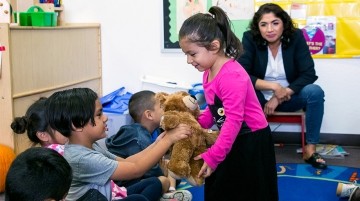Whole Child Approaches to Education Especially Effective for Students Living With Trauma

New study identifies policy and practice strategies that foster strong academic, social, and emotional learning, based on the science of learning and development
Each year in the United States, 46 million children are exposed to violence, crime, abuse, homelessness, or food insecurity, as well as a range of other experiences that cause psychological trauma. These experiences create toxic stress that can affect children’s attention, learning, and behavior. Research on human development shows that the effects of such trauma can be mitigated when students learn in a positive school climate that offers long-term, secure relationships that support academic, physical, cognitive, social, and emotional development — an approach known as “whole child” education. Indeed, such an environment boosts achievement for all children, regardless of their circumstances.
A new report from the Learning Policy Institute (LPI), Educating the Whole Child: Improving School Climate to Support Student Success, describes how state and district policymakers, school leaders, and teachers can support students’ healthy growth and development, and help children overcome toxic stress and trauma, including stereotype threats that undermine achievement. Drawing on a broad body of neuroscience, science of learning, and child development research, the report explains how schools can use effective, research-based practices to put students’ healthy growth and development at the center of classroom design and the school as a whole. It summarizes evidence about the effects of positive school climate, social-emotional learning, and productive teaching strategies on achievement. The report also identifies policy strategies that can foster these conditions and practices on a wide scale. While whole child approaches are ideal for all students, they are especially important for students living with trauma.
“Human relationships are at the heart of teaching and learning,” said Linda Darling-Hammond, LPI President and CEO. “When you ask students what motivated them to keep learning when something hard was happening in their life or to power through a difficult assignment, they’ll talk about a person, not the curriculum. This is something we’ve always known intuitively, but there is also a large body of research on learning and development that points to the power of relationships and a positive school climate in supporting students’ learning.”
The study highlights six key findings from the science of learning and development and, based on those findings, includes key policy recommendations for practice and policy. Key findings are:
- Development is malleable, and the brain’s capacity develops most fully when children and youth feel emotionally and physically safe and connected, and when they are interacting with others.
- Development is variable and unique; as a result, not all students can learn well with one sequence or rigid pacing guide.
- Human relationships are the essential ingredient for healthy development and learning.
- Adversity affects learning—and schools should assist children in handling adversity rather than use punitive discipline tactics.
- Learning is social and emotional as well as academic: Emotions affect learning. In addition, students’ abilities to manage their feelings and behavior, along with their ability to interact positively with peers and adults, to resolve conflicts, and to work in teams, all contribute to effective learning and lifelong behaviors.
- Children actively construct knowledge based on their experiences, relationships, and social contexts and this process works best when students engage in active, hands-on learning, and when they can connect new knowledge to personally relevant topics and lived experiences.
Educating the Whole Child also discusses key strategies educators can use to create productive school environments, including how to:
- Build positive classroom and school environments,
- Shape positive student behaviors,
- Use educative and restorative approaches to discipline,
- Provide supports for student motivation and learning, and
- Create multi-tiered systems of support to address student needs.
For policymakers, the report details the following policy strategies:
- Developing and assessing positive learning environments.
- Using school climate data to diagnose school needs.
- Helping schools improve climate and culture.
- Reducing rates of exclusionary discipline.
- Providing a multi-tiered system of student support.
- Investing in educator preparation and development.
For details, please see the report at this link.
###
About the Learning Policy Institute
The Learning Policy Institute conducts and communicates independent, high-quality research to improve education policy and practice. Working with policymakers, researchers, educators, community groups, and others, the Institute seeks to advance evidence-based policies that support empowering and equitable learning for each and every child. Nonprofit and nonpartisan, the Institute connects policymakers and stakeholders at the local, state, and federal levels with the evidence, ideas, and actions needed to strengthen the education system from preschool through college and career readiness.
